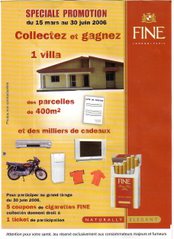March 21, 2008
http://www.guardian.co.uk/science/2006/dec/08/smoking.frontpagenews
The Guardian (Dec. 8, 2006) révèle que l'imminent chercheur et cancérologue Richard Doll, admiré par la communauté anti-tabac, pionnier fameux pour avoir dénoncé le lien entre tabac et cancer et affronté l'industrie du tabac sur ce sujet, a volontairement minimisé l'impact des toxiques de l'environnement sur le cancer. Il était payé depuis 20 ans par Monsanto. Il est important, à mon avis, de faire la lumière sur cette affaire et s'assurer que les positions actuelles des militants anti-tabac tiennent compte des influences mensongères qui nous auraient éventuellement conduits à des erreurs d'analyse et surtout de communication autour de la dangerosité relative du tabac par rapport aux autres éléments toxiques qui nous entourent. Notre but est la santé publique, pas l'abolition de la cigarette! C'est certain que c'est toujours décevant que de découvrir qu'on s'est fait avoir, mais il vaut mieux regarder la réalité en face et réagir que de pratiquer le déni.
En 1981, Sir Richard Doll avait publié un article très cité sur l’épidémiologie du cancer, dans lequel il affirmait que les causes environnementales jouent un rôle très limité dans la progression de la maladie … Seulement voilà : la légende a volé en éclats en 2006, lorsque The Guardian révéla que l’honorable Sir Doll avait travaillé secrètement pour Monsanto pendant vingt ans !
Parmi les archives qu’il avait déposées en 2002 dans la bibliothèque du Welcome Trust, figurait une lettre, datée du 29 avril 1986, avec l’en-tête de la firme de Saint-Louis.Rédigée par William Gaffey, un scientifique de Monsanto, auteur d’ études manipulées sur la dioxine, (et dûment publiées dans des revues scientifiques de référence, "peer reviewed, etc) elle confirmait le renouvellement du contrat à raison de 1 500 dollars par jour... ( « Renowned cancer scientist was paid by chemical firm for 20 years », The Guardian, 8/12/2006 ; L. Hardell , MJ walker, B. Wahljalt, LS Friedman et ED Richter, « Secret ties to industry and conflicting interests in cancer research, American Journal of Industrial Medecine , 3/11/2006.)
ALSO
China is hiring 1 million tobacco workers to increase production!!!
| China's new tobacco campaign |
December 19, 2008
Yu Hongyan
China's State Tobacco Monopoly Administration is set to use the redundant labor from the crisis-hit manufacturing industries to expand China's tobacco farming. Up to 1 million workers will be hired.
"We will invest 40 billion yuan ($5.84 billion) for tobacco farmers to increase their acreage by 35 million mu (2.33 million hectares)," said Jiang Chengkang, an official with the national tobacco monopoly.
The weekly newspaper China Business Journal, quoted him as saying that as a reward to the farmers, the State Tobacco Monopoly Administration "will increase the purchasing price for their tobacco leaves by 20 percent."
Some 27 billion yuan of investment has already been spent since 2005, largely in tobacco farming related infrastructure development.
The new infrastructure projects, particularly water works, can also benefit farmers in other ways, for example providing them with high quality drinking water, said Guang Boqian, an official with China National Tobacco Corporation, the sales arm of the State Tobacco Monopoly Administration.





